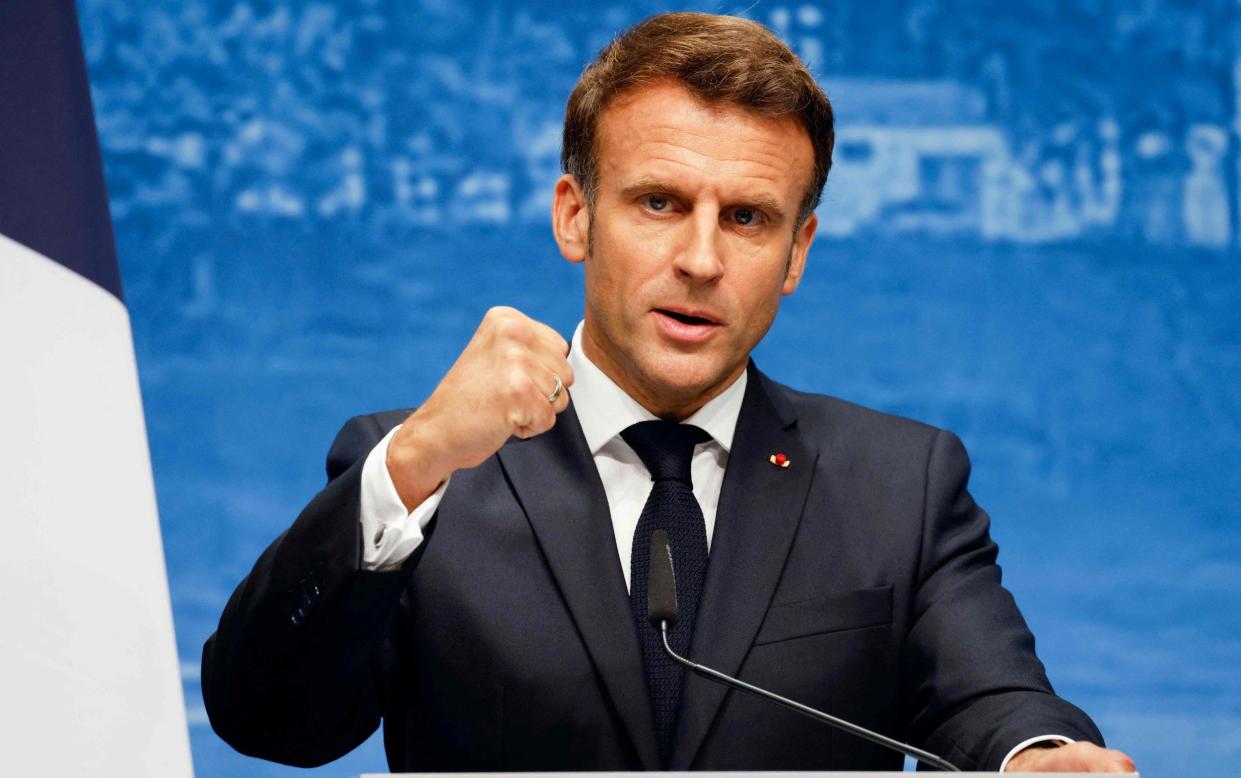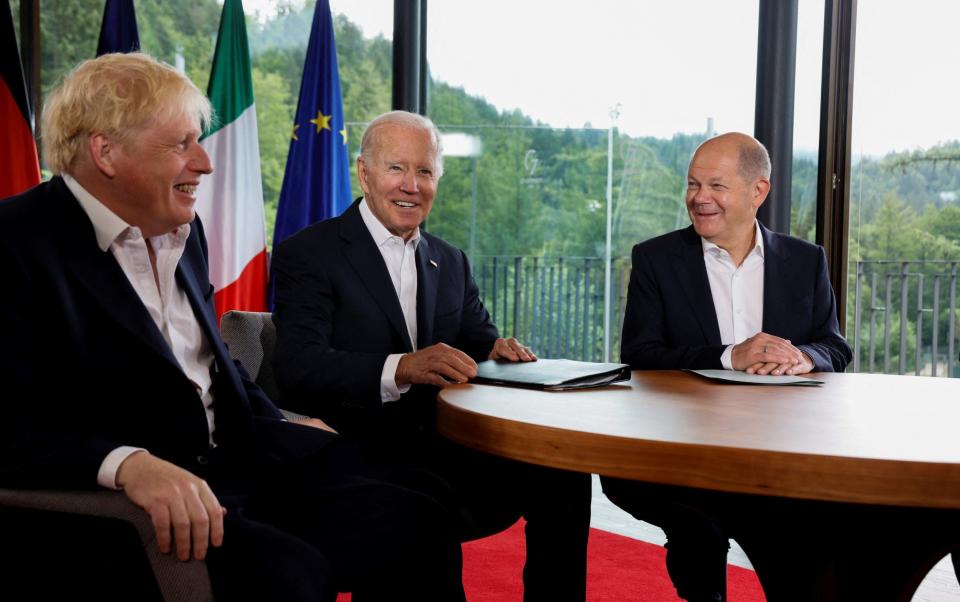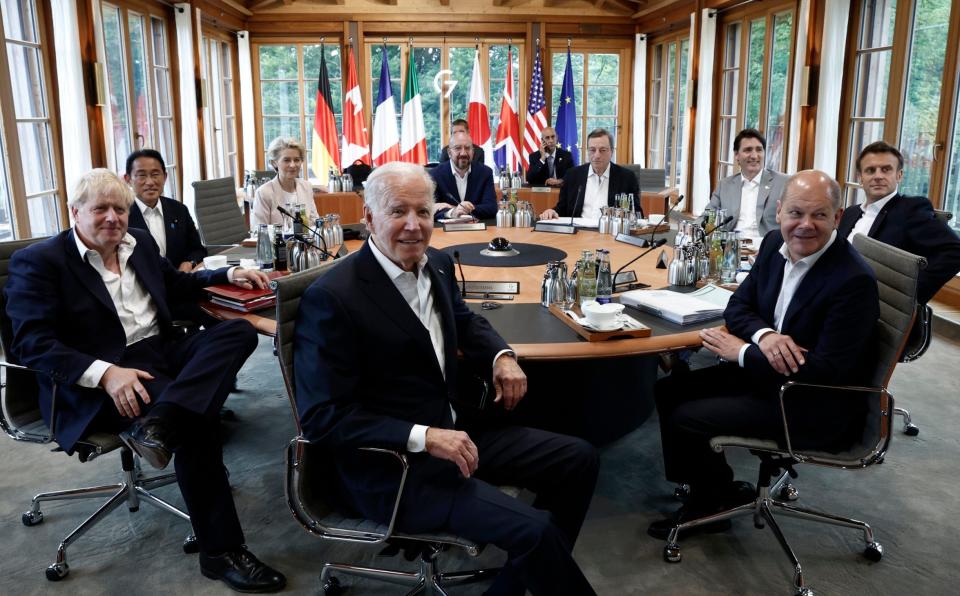Russia ‘cannot and must not win’, Emmanuel Macron declares in change of tune on Ukraine war

President Emmanuel Macron on Tuesday said Russia must not be allowed to win the war in Ukraine in a hardening of his rhetoric against Moscow.
In a marked change of tone from his call on world powers not to “humiliate” Vladimir Putin, the French leader said Western allies should be ready to back Kyiv for as long as necessary to achieve victory.
“I really hope that the end [of the conflict] can be achieved by the end of the year, with a certainty and a desire, which is that Russia cannot and must not win,” Mr Macron told reporters at the end of a G7 meeting in Bavaria.
The French president’s comments will ease concerns amongst allies, including Boris Johnson, that he could coerce Ukraine into signing a bad peace deal with Russia.
Mr Macron has previously prompted accusations of appeasement by maintaining an open dialogue with his Russian counterpart during the war. His comments were seen as an attempt to align more closely with other G7 leaders.
As firefighters and soldiers searched for survivors in the rubble of a Ukrainian shopping centre bombed by Russian forces, the French president said such attacks on civilian targets demonstrated the need to intensify military support for Ukraine and further sanctions against Moscow.
“Our support for Ukraine and our sanctions against Russia will continue as long as is necessary and with the necessary intensity in the coming days,” he said.
The German chancellor, who has also been criticised for his hesitancy to back Ukraine, said Western sanctions on Russia would only be lifted when Mr Putin accepted his invasion has failed.
Olaf Scholz said: “All the sanctions we imposed over Crimea are still there. All the sanctions we imposed because of the Russian-incited uprising in Donbas are still there. And the same will go for the decisions taken now, which are much more severe.
“There is only one way out: for Putin to accept that his plans in Ukraine will not succeed,” he added.
Speaking at a post-summit news conference, Mr Scholz backed a “Marshall Plan for Ukraine”, drawing inspiration from the US aid programme for Europe after the Second World War.
Germany only delivered its first heavy weapons to Ukraine last week, and has so far failed to fulfil its pledges of support at the same speed as other allies.
Mr Johnson appeared to acknowledge that the Russian attack on the Ukrainian shopping centre, which killed at least 18 people, had helped to move the dial.
The Prime Minister said Vladimir Putin was an example of “toxic masculinity” and would not have invaded Ukraine if he was a woman.
“If Putin were a woman, which he obviously isn’t, but if he were, I really don't think he would have embarked on a crazy macho war of invasion of violence in the way that he has,” Mr Johnson said in an interview with ZDF, a German broadcaster.
“If you want a perfect example of toxic masculinity it’s what he is doing in Ukraine.”
‘Utter barbarism’
“If anything it helped those of us making the case for helping to protect the Ukrainians to get that message across to some of those that are more swing voters in this argument,” the Prime Minister told broadcasters on Tuesday.
“They can see this is utter barbarism. One of the things we’ve seen in this G7 today is a really, really powerful sense of unity and resolve, and purpose, and absolute determination to give the Ukrainians the support to keep going.”
The final communiqué agreed by G7 leaders said: “We will stand with Ukraine for as long as it takes, providing the needed financial, humanitarian, military and diplomatic support in its courageous defence of its sovereignty and territorial integrity.”
It also announced a further £24.1 billion in aid for Kyiv this year.

At their summit in the Bavarian Alps, G7 leaders also vowed to explore plans to ratchet up pressure on the Kremlin with a price cap on Russian oil.
The proposal was tabled amid mounting fears Moscow’s war machine is being funded by a surge in energy prices, despite swathes of Western sanctions.
“Some producers and speculators are making a lot of money with the current war,” Mr Macron said.
In a statement published after the summit, leaders said they were “working to make sure Russia does not exploit its position as an energy producer to profit from its aggression at the expense of vulnerable countries”.
They also agreed to hold technical talks on the possibility of introducing a similar price cap on Russian gas exports.
“We are supportive of the basic structure,” a G7 official said. “But the details need to be hammered out.”
Under the initial plans, businesses would be banned from facilitating the transportation of Russian seaborne oil unless it is priced at or below a cap, which is still to be decided by world leaders.
It would effectively prevent European insurers from covering Russian shipment, as well as block Western tankers from carrying the oil.

However, there are concerns about whether the G7 would secure the support of enough countries to make the price cap effective.
G7 leaders also pledged £3.6 billion to shore up global food security as fears spread of a hunger crisis triggered by Russia’s blockade of Ukraine’s ports.
A US official said programmes would be launched in 47 countries to “help save lives through direct humanitarian interventions”.
Mr Scholz said Germany would be “significantly involved” in dishing out food aid to those countries in need.
Max Lawson, the head of inequality policy at Oxfam, said the G7’s funding promise had fallen short by at least £23.3 billion.
“Faced with the worst hunger crisis in a generation, the G7 have simply failed to take the action that is needed. Many millions will face terrible hunger and starvation as a result,” he said.
“Instead of doing what is needed, the G7 are leaving millions to starve and cooking the planet.”

 Yahoo Movies
Yahoo Movies 
